Islamist terrorists have struck Europe again. The attack in Vienna, Austria, following the attack in Nice, France, shows that while the coronavirus paralyzes the world, radical Islamists are unwilling to halt their jihadioperations. This new wave of attacks began in September when two people were stabbed near the former offices of Charlie Hebdo, a French magazine that published cartoons of the Prophet Muhammad. Then on October 16, a Muslim refugee killed and beheaded a teacher in a Paris suburb, and on October 29, another Muslim terrorist attacked churchgoers and killed three, among whom was a 70-year-old woman.
Meanwhile, Turkish President Recep Tayyip Erdogan has been extremely critical of the West, particularly France, and has called on Muslims to boycott French products while saying President Emmanuel Macron should have “mental health checks” for his comments on free speech after the attacks. This boycott takes Turkey “even further” from becoming a member of the European Union, according to a spokesperson at the European Commission.
Modern Sultan of Turkey
Turkey had enjoyed good relationships with both its Muslim and non-Muslim neighbors. However, under the leadership of Turkish President Recep Tayyip Erdogan in the last two decades, the country has been sliding back to its past when Ottoman sultans ruled. The Ottomans’ military expeditions attempted to eradicate Christianity and impose the sultans’ brand of Islam on the East and West. Whether Erdogan sees himself as a modern sultan or not, his Islamic rhetoric has led some Turks to believe that he is the new sultan. Globally, he has presented himself as the defender of Muslims and Islam by criticizing Europe, and at home he has reversed reforms of Kemal Ataturk (1881–1938), the founder of the modern Republic of Turkey. Erdogan has also lifted the decades-old ban on the hijab in state institutions as a part of a broader package of Islamic reforms.
Pakistan under Zia
A popular leader or dictator using Islamization to consolidate power by aligning with ultraconservatives or radicals has become common practice in the Islamic world. Almost every Muslim country has gone through this process, including Pakistan, a country born out of fear that the Hindu majority in India would suppress its Muslim population. The founders of Pakistan’s vision favored a modern secular state with guaranteed freedom of religion for all. However, with decades of bad politics and Islamist influence, especially under Muhammad Zia-ul-Haq (president from 1978–88), the country has sustained irreparable damage. Unfortunately, once thought to be a modern and progressive Islamic nation, Turkey is now well on its way to becoming the next Pakistan.
Erdogan and Zia
Erdogan and Zia share similarities. Both rose to power from humble beginnings with religious zeal and were supported by the Islamists of their time. Both consolidated power by cracking down on opponents, imprisoning them, and installing religious people into strategic positions to ensure absolute power. After Erdogan was declared the victor in the 2018 presidential election, one politician said Turkey was entering a dangerous period of “one-man rule.” When Zia seized power in 1977 through a bloodless military coup, his government wrongly tried and executed Zulfikar Ali Bhutto, the popularly elected prime minister, and Zia established one-man rule. He then held a controversial referendum in 1984 to legitimize his rule. His landslide victory gave him unprecedented power and made his regime acceptable to the democratic West. But he was still a dictator-president who acted like a sultan.
The Islamization of Pakistan was the supreme achievement of his tenure, which proved to be devastating for the country. The state approved an Islamic curriculum, the rapid growth of Islamic schools, the adaptation of strict blasphemy laws, and a jihadi strategy to recruit, train, and deploy fighters in neighboring countries, which all hastened the Islamization of the country. Zia put the nation on a path to self-destruction and religious intolerance against the minorities.
Turkey’s Zia
Following Zia’s steps, Erdogan has heavily invested in Islamic schools to create a “pious generation” that will reshape Turkey. In 2018 his government doubled the funding for religious schools. His religious policies have transformed Turkish media, law and order, and domestic and foreign policies. Under his command, the Turkish military is engaged in several major conflicts in the region. With the trajectory of the Islamization of Turkey, it would not take too long for Turkey to resemble Pakistan.
Erdogan demands respect for his religion in the West, but at home and elsewhere his policies are eradicating Christianity. The longer he rules, the harder it will be for Turkey to recover from Islamization. The Turkish people should learn from Pakistan and should not allow Erdogan to radicalize the country any further.







 Sponsor a student for Christianity & National Security 2024
Sponsor a student for Christianity & National Security 2024